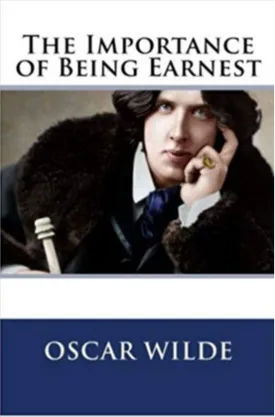The Importance of Being Earnest by Oscar Wilde
Oscar Wilde’s classic comedy of manners, “The Importance of Being Earnest”, was first performed in 1895. Provoking much laughter with its witty dialogue and tantalizing repartee, the play is a farcical send up of Victorian social codes, propriety, and hypocrisies. Without a doubt, the play remains one of Wilde’s most recognizable works and has established itself as a timeless classic of English literature.
The play focuses on two upper-class gentlemen, Jack Worthing and Algernon Moncrieff and their farcical attempts to escape the confines of Victorian respectability and propriety. Jack, an orphan, has been living in the country with his ‘prisoner’, Cecily Cardew. In the city, he adopts the name Ernest and fabricates a reckless and glamorous brother to lend himself an air of sophistication. Meanwhile, Algernon, a confirmed bachelor, also invents a character—a sickly and lost relative—in order to travel to the country and meet Cecily.
As the play progresses, the two characters ultimately try to win the hearts of young women—Jack intends to marry Gwendolen and Algernon hopes to woo Cecily. As with most of Wilde’s work, the plot is heavily laden with satire. Jack’ and Algernon’s attempts to gain their monied brides through false pretenses act as a sharp condemnation of society’s obsession with money and status.
The first use of the title phrase “The Importance of Being Earnest” occurs in the dialogue of the play’s third act. Gwendolen, when referring to her intended, is adamant that he be named Ernest. This is because, as she declares, “the name seems to inspire absolute confidence.” In such a statement Wilde is implying that propriety and morality is not, as is often assumed in the Victorian period, the result of honest dealings and earnest convictions.
Indeed, this is an idea which is constantly reasserted throughout the play. Algernon, when claiming his Aunt Augusta’s blessing to marry Cecily, is commanded by his would-be benefactor to “Never speak to me of [matrimony] again as long as you live.” Despite the hypocrisy of this scenario, Algernon is granted a reprieve by his aunt when she reveals that she “expected [such behaviour] of [him]” and is even more pleased when told of his fictional ‘Ernest’.
Throughout “The Importance of Being Earnest” Wilde sarcastically pokes fun at the Victorian upper-class and their attitudes. Even the title of the play implies a double entendre, in which Wilde simultaneously reveals the importance of being genuinely earnest and also exposes the importance of appearing to be so.
The laughs in Wilde’s classic farce often come at the expense of the conservative social norms of the Victorian era. The humour of the play comes from its farcical juxtaposition of seemingly moral ideals such as honesty and dependability with the underlying realities of how people actually behave—the hypocritical overtones add an extra level of comedy.
The timeless presence of “The Importance of Being Earnest” as a classic comedy of manners can be attributed to a number of factors. Not only does Wilde masterfully navigate the border between humor and satire, but his play continues to critically reflect on the human condition. Whether it be critiquing our tendency towards hypocrisy, the obligations of respectability, or the frivolity of courtship and marriage, Oscar Wilde’s “The Importance of Being Earnest” remains as relevant and entertaining today as it was when it debuted over a hundred years ago.

